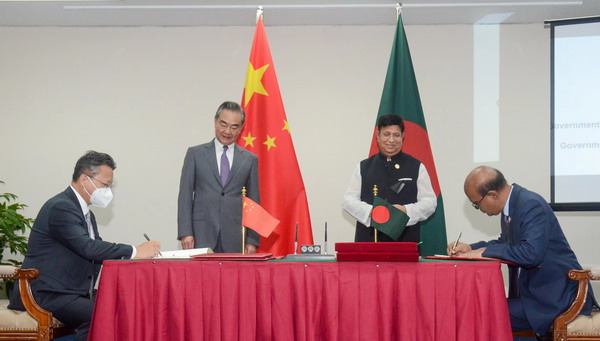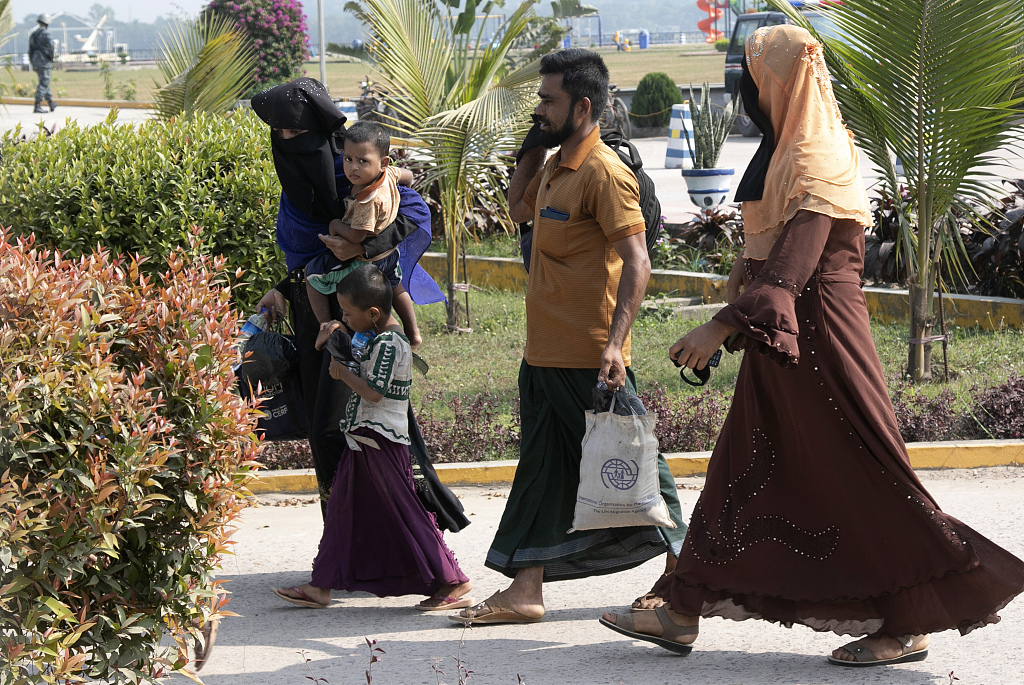
Chinese State Councilor and Foreign Minister Wang Yi (2nd L) and Bangladeshi Foreign Minister AK Abdul Momen (2nd R) witness the signing of bilateral cooperation documents in Dhaka, Bangladesh, August 7, 2022. /Chinese Foreign Ministry
Chinese State Councilor and Foreign Minister Wang Yi (2nd L) and Bangladeshi Foreign Minister AK Abdul Momen (2nd R) witness the signing of bilateral cooperation documents in Dhaka, Bangladesh, August 7, 2022. /Chinese Foreign Ministry
Editor's note: Emilia Fernandez, a security and political analyst with a focus on South Asian geopolitics, is a Ph.D. researcher at the University of Lucerne, Switzerland. The article reflects the author's views and not necessarily those of CGTN.
Chinese State Councilor and Foreign Minister Wang Yi was on a two-day visit in Bangladesh as part of his multi-legged trips to South and South East Asian nations from August 6 to August 8. Wang's visit to Bangladesh is at a time when the world is sailing through turbulence due to heightened tension over the Taiwan question and the Ukraine crisis. The multiple issues, ranging from bilateral to regional to global, discussed with Bangladesh's Prime Minister Sheikh Hasina and Foreign Minister AK Abdul Momen clearly testifies the significance of this official visit not only in the context of growing Sino-Bangladesh relations but also in rapidly changing geopolitical dynamics.
During an hour-long bilateral meeting with his Bangladeshi counterpart, the top Chinese diplomat signed four agreements and Memorandums of Understanding (MoUs) to enhance cooperation between Dhaka and Beijing. These instruments are signed for cooperation on cultural exchange, disaster management, and marine science advancement. Upon successful implementation, these cooperative agreements will "elevate" the friendship between the two to a "new height."
Since the "Clearance Operation" in Rakhine State of Myanmar in 2017, Bangladesh has been generously hosting 1.2 million Rohingyas as "short-term" guests. For the last five years, Bangladesh has been bearing the substantial socio-economic burden of supporting the persecuted Rohingyas, which has now become next to impossible as there has been a significant slashing of external donations for supporting the Rohingyas. Besides, Bangladesh alone cannot afford to support this huge population because of its limited financial resources and capabilities.
During this recent visit, it was confirmed from the Chinese side that Beijing is committed to and sincerely working to find a peaceful solution to resolve the Rohingya crisis. As Bangladesh considers the Rohingya crisis as a big threat to national security, having assurance from a global partner like China for resolving the crisis is like a blessing for Dhaka.
At the very outset of 2022, China granted duty-free access to 98 percent of Bangladeshi products. During this visit, China increased the scope of duty holiday for Bangladeshi products to its market by another 1 percent which is officially going to be effective from September 2022. This zero tariff facility will eliminate the restrictions on exporting oven products from the Ready Made Garments sectors of Bangladesh to China and help Bangladesh to minimize the trade deficit with China.

Rohingya refugees arrive at Chittagong boat club to board naval vessels that will take them to Bhasan Char island in Chittagong Division, Bangladesh, November 25, 2021. /CFP
Rohingya refugees arrive at Chittagong boat club to board naval vessels that will take them to Bhasan Char island in Chittagong Division, Bangladesh, November 25, 2021. /CFP
Apart from that, the Chinese foreign minister agreed to conduct a joint survey on probable prioritized trade agreements between these two countries. Besides, Bangladesh successfully convinced its Chinese counterpart to relocate Chinese companies, i.e. Sunset Industries, in Bangladesh. On top of that, China confirmed to share latest technologies and technological know-how with Bangladesh for the latter's economic zones.
Wang Yi promised to start the activities in a special economic zone in Chattogram soon. Both parties also discussed ways to address the trade disparity, the biggest problems in their bilateral ties, which exist in the two-way trade between Beijing and Dhaka.
Apart from bilateral issues and the Taiwan question, both parties discussed the Global Development Initiative (GDI), a people-centered approach to put development on the global priority agenda to achieve the UN Sustainable Development Goals (SDGs). On the part of Dhaka, it agreed to study the proposals that will be received under GDI. Apart from supporting Bangladesh's development journey, the GDI will boost Bangladesh's efforts in economic recovery in the post-pandemic era.
Around five thousand Bangladeshi students are studying in different Chinese universities who have been stuck in Bangladesh during the pandemic. This issue has been seriously discussed in the meeting with the Chinese delegation team. And, senior diplomats from Chinese side assured Bangladesh to issue visas for Bangladeshi students to pave their way to return to China as soon as possible.
After the recent "controversial visit" to China's Taiwan region by the U.S. House of Representatives Speaker Nancy Pelosi, Bangladesh reiterated its firm adherence to support the one-China principle and requested relevant parties to resolve the issues through dialogue and discussion. During the visit, Wang highly appreciated Bangladesh's longstanding commitment to the one-China principle.
During a courtesy call with Bangladesh's Prime Minister, Wang termed Bangladesh as a "strategic development partner" and assured to keep supporting Bangladesh "on all issues at international forums." This statement clearly shows the growing convergence between China and Bangladesh on various regional and global issues. Apart from addressing the mutual concerns and interests, a clear roadmap was drawn for bolstering their future ties.
Also, this visit is expected to strengthen their bilateral relations in trade, investment and technological assistance. On the whole, this has been a "politically significant" and "economically productive" trip for both countries as it is a step towards strengthening strategic ties between Beijing and Dhaka.
(If you want to contribute and have specific expertise, please contact us at opinions@cgtn.com. Follow @thouse_opinions on Twitter to discover the latest commentaries on CGTN Opinion Section.)

